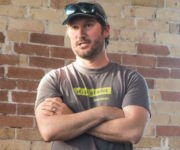Meet the Match
An Advocate Goes to the Extreme for Macedonians with Disabilities
Growing up in the small town of Kocani in Macedonia, Vangel Trkaljanov was always obsessed with movement. As a boy, this passion manifested itself through sports, whether swimming, gymnastics, karate or basketball. He was close to a qualifying time for the Olympics as a swimmer, before he made his way into extreme sports—a greater thrill. He learned how to paraglide, and even played a role in building the city’s first skate park.
“Sports are actually what helps keep me calm,” Vangel says, laughing. “I am probably what you’d call an adrenaline junkie.”
During the third year of his agricultural engineering degree at Saints Cyril and Methodius University of Skopje, Vangel was on vacation with a friend ion Bulgaria when they decided to jump into a pool. It was nothing out of the ordinary for him. But, on one of his jumps, Vangel landed in shallow water and broke his neck, leaving him paralyzed.
After surgery and four months in rehabilitation, Vangel was in a wheelchair, but never gave up hope of one day flying through the sky again. He looked to his father, Vladimir, who was mostly blind resulting from a work accident as a boy and still managed to play basketball, football, and become one of Macedonia’s top Paralympic chess players.
“I always expected there would be one day when I would walk again,” Vangel says. “I would spend hours watching tutorials for different exercises, and the result is I can now ski, skydive, snorkel, paraglide. Usually, you won’t see quads who are as rehabilitated as I am.”
Since his injury, Vangel has served as president of the NGO Without Restrictions, which provides sports and other services to paraplegics and quadriplegics in Macedonia. Over the years, he has led several key projects: developing and implementing a wheelchair donation program from the U.S. to eastern Macedonia; renovating a club for disabled people in Kocani; procuring special equipment for tandem parachute jumping; and leading sessions to teach wheelchair users how to handle their chairs in inaccessible and bad surface conditions.
With his long list of accolades in the disability and business sectors, Vangel was appointed as a special advisor in the Ministry of Labor and Social Policy in 2017. He is currently working on projects to introduce ski sports and hand cycling in Macedonia. For a decade, Skopje has been among the most polluted cities in Europe, and he is launching a project this spring that promotes hand cycling as an alternative to driving.
Of the challenges facing Vangel and his vision for progress, societal ignorance is often the most pervasive and connected to issues of infrastructure and inaccessibility. As an example, he cites the everyday experience of rolling down the street in a wheelchair: often people will turn their heads or avoid him if they are with children so they do not have to explain what they are seeing.
This ignorance to disability manifests itself in a severe lack of ramps, lifts, and accessible toilets in public spaces. Vangel’s NGO addresses these issues through different projects, which include installing ramps at restaurants.
“There is a law that obligates accessibility, but no one is abiding by the law,” Vangel says. “So we decided to start financing them ourselves. We host parties and all the profits go to the restaurants that support our projects.”
According to an analysis of government statistics, there may be as many as 400,000 people with disabilities in Macedonia. Vangel is currently working on numerous projects to improve their quality of life, including lobbying for a new anti-discrimination law (or improvements to the existing law) and arranging special help to meet the needs of people with disabilities.
Vangel sees his participation in the U.S. Department of State Global Sports Mentoring Program as facilitating the road to accomplishing his dreams for Macedonia’s disability community. During the program, he worked with Steve Robinson, global education developer for National Ability Center, a U.S. Paralympic sports club that provides 30,000 annual sports experiences and engage more than 1,000 volunteers in Park City, Utah. As Vangel learned more about inclusive sports and education, fundraising, and advocacy, he was ideally positioned at an organization that is among the top providers of winter sports for people with disabilities in the United States. At the same time, as he continues securing equipment and volunteers for developing winter and outdoor sports in Macedonia, he brings a unique development perspective for potential long-term impact and collaboration.

